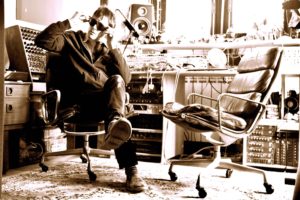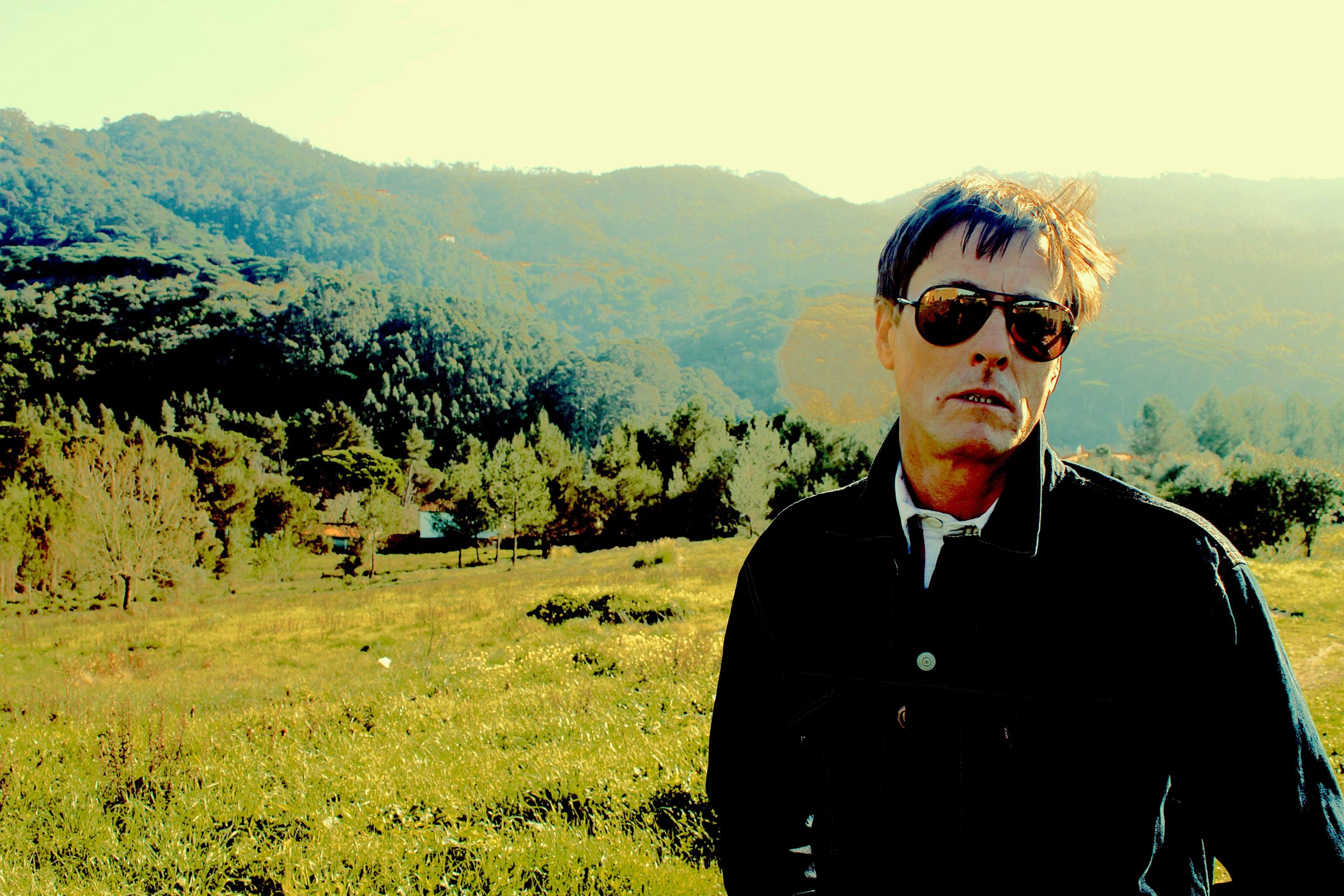It is somehow only appropriate that Peter Kember, the Spacemen 3 co-founder, would want to get away from it all, to create his own literal and figurative psychedelic universe. His music—whether with S3 or as Spectrum, E.A.R. (Experimental Audio Research), or Sonic Boom—has always felt adrift and without mooring, that space in the horizon (to borrow the words of Nora Zeale Hurston), never out of sight, never landing until the Watcher turns his eyes away in resignation.
In relocating from cluster-fucked London to the spacious golden beaches of Portugal and reigniting the Sonic Boom name for his first solo album in thirty years, Kember has, with All Things Being Equal, found a psilocybin-ized, Leaves of Grass-esque, future-past-like vision of transcendence. Hovering over his banks of minimalist analog synths and their throbbing techno-blues yawn, Kember and his great airy baritone peel through a personalized poetry—guided by naturalism and animism—where mortality feels more fantastic than it does fatalistic.
Speaking on Earth Day, as we are, is fortuitous, as many of the issues you raise on All Things Being Equal are Edenic and climate-based.
As it should be. It’s a planet we’re poisoning every day.
When did tending to earth—worrying about the ecology and the interplanetary as you’re talking about other universes—become your concern? Was this a thing of your youth, or did it come with age, travel, and experience?
I think there was something of a focus on it in my youth. Reading Buckminster Fuller [back then] would be a great example. Since then, it’s been a slowly growing thing for me. In Spacemen 3, there was a song that I wrote, “The World Is Dying.” The problem has always been self-centeredness, people thinking only about themselves. Purchase power and consumerism without consideration—the after effects of all that. You need only to walk along a beach anywhere on the planet to see.
I go out a lot to the beach here, not only for my body and exercise, but do some good for the planet. I don’t remember being a kid and seeing so much plastic littering the beach. Now, everything that can float winds up there—and it all breaks down slowly, as you know. I pick up as much plastic as I can on a regular basis. It makes me feel just a little bit better. It also makes me think about how much plastic I have used and expended in my lifetime—how much has been wasted in my name. It’s the tip of the iceberg.
“Humanity is usually ruled by two things: punishment and incentive. If there is another option, it is aspiration, of which inspiration is a part. I wanted to try to do whatever I could to show that there is aspiration in caring about the planet, the things that are hurting it, and the ways in which we can stop the hurting.”
Most people have no room in their lives for thinking about or dealing with it. I really wanted to make a record that showed, at least aspirationally, what it would mean to think like that. Humanity is usually ruled by two things: punishment and incentive. If there is another option, it is aspiration, of which inspiration is a part. I wanted to try to do whatever I could to show that there is aspiration in caring about the planet, the things that are hurting it, and the ways in which we can stop the hurting. The ways we treat each other, the earth’s inhabitants, come from all that.
As a race, we might think that we are the smartest creatures on the planet—and, as far as we know, we are—one with an overriding vision as to all that is going on. There needs to be more of that: thinking. We need to look at ourselves, and what we do, not mete it out to politicians to do everything for us. They’re helping to create these problems every day. My suggestion, then, is to vote for issues, not politicians. We can deconstruct and repair and prove that we are better.
How would you describe—or not describe—yourself as a spiritual being?
I do consider myself as such, but I do not subscribe to an organized religion. My opinion is that Christianity—of which I am best able to speak about—is a bit like a certificate that you hit “I agree” as you would when you download software. It’s something you never truly read up about, or was made to be understood in the first place. If you did read it, it’s written in a sort of legal language. The roots of most people’s beliefs in Christianity, then, is based on passed-down dogma, the things my parents believed—or what they were told—without thinking. I think the roots of all religions are credited to psychedelic drugs.

photo by Ian Witchell
Many people who want to change the planet come from the world of psychedelic experience. They inspire connectivity. Or connectivity inspires them.
There is an urge toward symbiosis. Psychedelic states open up your mind with a better view to see this all happening. Seeing how elements of nature support and enrich each other. Show life to be something more than the sum of its parts. So I do feel spiritual, but in the way where everything has a soul—a table, a tree…
Back to psychedelic drugs for one sec—we’ve spoken in the long-ago past, so I know about your drug use. Looking at it now, was it a spiritual quest, or an intellectual quest, or did you just want to get high?
I don’t think it was spiritual, as I was never really looking for God or a God system. I would like God to explain all that is unexplainable. That’s how they came up with religion in the first place. They couldn’t explain spring and seasonal change? They fashioned a god for it. That makes as much sense to me as anything. I’m just trying to get right and do right with everything on this planet, sharing the DNA with a banana, or a mouse.
“Some people call this old-fashioned, but there’s human social interaction here. I wave to people I see on the street. There are little shops here. There’s lot of “good mornings” here. Go a few miles from here, toward, Lisbon, and that’s gone.”
Speaking on overpopulation, do you believe that the coronavirus is God, or the universe’s way of righting some wrongs? That we’ve done enough harm, and here’s the thinning-out process?
For every action, there’s an equal and opposite reaction, right? It’s not always visible to us, but it exists. There is some law somewhere where if you push a thing too far, it will collapse. And it’s collapsed. Coronavirus is one of those actions—the overuse of global travel. It’s too easy and too cheap. We are seduced through advertising, to be somewhere now, but it is up to us to resist.
How much of everything we just discussed weighed on your notion to move from the U.K. to Portugal?
Some days I wonder if I went far enough [laughs]. I wanted to be far away from modern, conventional life. Some people call this old-fashioned, but there’s human social interaction here. I wave to people I see on the street. There are little shops here. There’s lot of “good mornings” here. Go a few miles from here, toward, Lisbon, and that’s gone. Nobody looks at each other. Nobody pays attention to anyone else. I wanted something more real and less self-interested than what I have encountered in most cities. I don’t understand why people are so focused on themselves I the first place. I didn’t want to be like that, and, I really didn’t want to be around people who felt like that. So I got away from an urban environment to live in nature.
You’re pleased to live within nature and be more social, yet Sonic Boom has continued to be pretty much just you, and is nearly all analog synths.
It is. Entirely. I am waiting to mention it to my neighbors though [laughs].
How does the literal and figurative environment seep into this new album? I ask because we spoke around the time you produced Tomboy for Panda Bear, and you mentioned how much the purity of winter affected its sound.
A lot, actually. Even though I started the musical backings when I still lived in the U.K., moving here four years ago, doing mundane things, working at a different pace definitely shifted what I wanted to express, sonically and lyrically. I wanted to convey that which I felt: an environmental wellness. Things that plants do to and for people that people don’t appreciate: I wanted to make an album about that.
Photosynthesis is the very best way.
Yeah, it gave me something worth making a record to say. I also wanted to make it into an album people could relate to, not just be all about me. I don’t have any interest in making many records or leaving a massive catalog behind, so I have to make it count.
You don’t want to dirty up the beaches with all that excess music.
Exactly [laughs]. FL







